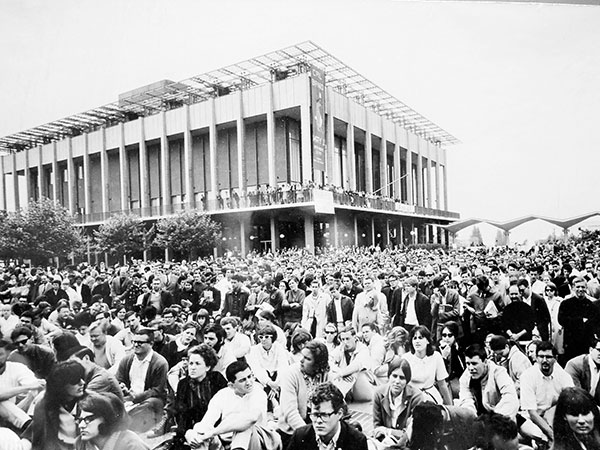Author Andrew Marantz talks trolls, tribulations and tumult
Marantz will speak Wednesday evening with Chancellor Carol Christ and Ed Wasserman, dean of Berkeley's journalism school
October 15, 2019

A student-sponsored Free Speech Week event in September 2017 drew hundreds of demonstrators from a variety of political persuasions to the campus. (UC Berkeley photo by Khaled Sayed)
The good news, let Andrew Marantz tell it, is that we are not doomed. But, Marantz quickly cautions, the road ahead is not without its jounces and jolts.
He ought to know. The New Yorker staff writer and author of the new book ANTISOCIAL: Online Extremists, Techno-Utopians, and the Hijacking of the American Conversation, spent three years embedded with alt-right trolls to understand how they had become powerful enough to influence our society, our politics, the media and just about every facet of our lives.
“I suppose I could have sat around and simply had an opinion, but I really wanted to know where these toxic ideas were coming from, what motivates people to do this and how they were promoting these ideas,” Marantz said of the myriad self-proclaimed fascists, white supremacists, right-wing nationalists and propagandists he studied. “I wanted to decode what they were doing.”
Marantz will share his discoveries this week at UC Berkeley when he joins Chancellor Carol Christ and Ed Wasserman, dean of the Graduate School of Journalism, Wednesday, Oct. 16, in a panel discussion. The talk begins at 7 p.m. at the Alumni House.
🔊 Special @UCBerkeley Event: ‘ANTISOCIAL: Online Extremists, Techno-Utopians, and the Hijacking of the American Conversation’ with @andrewmarantz @NewYorker, @ucbsoj Dean @edwardwasserman &
Chancellor Carol Christ 10/16 Alumni House 7PM: RSVP: https://t.co/X9n8urp24P. pic.twitter.com/4ZlOf4H5S7— UC Berkeley J-School (@ucbsoj) October 10, 2019
“This important book delves into issues that the campus, like the country as a whole, is currently grappling with,” said Christ. “How do we preserve free speech and respect for diversity of perspective in an era of extraordinary polarization? How do we maintain civic discourse during a time of hatred and extremism? These are difficult, complex challenges that we must confront for the sake of our democracy and the values that animate our university.”
Berkeley, of course, also has a bit of experience dealing with right-wing provocateurs and the subsequent issues revolving around free speech. In one of the more notable events, campus police had to evacuate the then-Breitbart editor and controversial speaker Milo Yiannopoulos from Berkeley and cancel his February 2017 event amid an apparently organized response that resulted in the destruction of property at the Martin Luther King Jr. Student Union.

In October 1964, the Free Speech Movement erupted at UC Berkeley, a signal moment in the history of student activism here and around the world. (Archive photo)
A wave of criticism followed, with free speech advocates advancing the erroneous claim that Berkeley — home of the Free Speech Movement — had tried to shut down free speech. A long list of conservative speakers lined up to speak on campus in an effort to test that unfounded assertion.
Marantz subsequently spent months researching free speech issues on campus, which he chronicled in a widely regarded article for The New Yorker. A key takeaway for Marantz: “Berkeley obviously couldn’t exercise prior restraint,” he says, referring to the legal principle of the government restraining speech before it takes place. “But it shouldn’t buy into the framing of free speech above all else. We need to look at ways to reframe the debate. Free speech is not an excuse for paralysis.”
Marantz, in a recent column for The New York Times, lamented that “noxious speech is causing tangible harm. Yet this fact implies a question so uncomfortable that many of us go to great lengths to avoid asking it. Namely, what should we — the government, private companies or individual citizens — be doing about it?”
He is careful not to make specific prescriptive recommendations, particularly regarding Berkeley’s handling of its controversial free speech events. Rather, Marantz quotes author and activist James Baldwin, who wrote: “Not everything that is faced can be changed, but nothing can be changed until it is faced.”
“Even before we can get to prescriptive steps, there’s a prior layer that we’ve got to look squarely in the face and lay bear what (trolls) are doing,” Marantz said. “We’re not doomed — and we are not saved. But the arc of history will bend in the way that we bend it.”